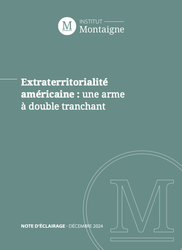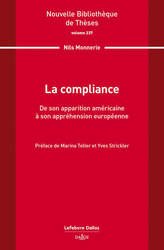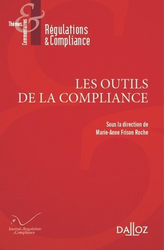Thesaurus : Doctrine

► Full Reference: Segonds, M., Compliance, Proportionality and Sanction. The example of the sanctions taken by the French Anticorruption Agency, in Frison-Roche, M.-A. (ed.),Compliance Monumental Goals, series "Compliance & Regulation", Journal of Regulation & Compliance (JoRC) and Bruylant, to be published.
___
► Article Summary: Before devoting the developments of his article to the sole perspective of sanctions imposed under "Anti-corruption Compliance", the author recalls in a more general way that, as is the sanction, Compliance is in essence proportional: Proportionality is inherent to Compliance as it conditions any sanction, including a sanction imposed under Compliance.
This link between Proportionality and Compliance has been underlined by the French Anti-Corruption Agency (Agence française anticorruption - AFA) with regard to risk mapping, which must measure risks to arrive at effective and proportional measures. This same spirit of proportionality animates the recommendations of the AFA which are intended to apply according to the size of the company and its concrete organisation. It governs sanctions even more, in that punitive sanctions refer on one hand to Criminal Law, centered on the requirement of proportionality. Punitive sanctions It governs sanctions even more, in that punitive sanctions refer on the other hand to the disciplinary power of the manager who, from other sources of law, must integrate the legal requirement of proportionality when he/she applies external and internal compliance norms.
____
_______
Oct. 15, 2025
Thesaurus : Doctrine
► Full Reference: Y. Feldman,Can the Public Be Trusted?: On the Promise and Perils of Voluntary Compliance, Cambridge University Press, 2025.
____
► Presentation of the book (done by the Author) : "When do citizens voluntarily comply with regulations rather than act out of fear of sanctions? Can the Public Be Trusted? challenges prevailing regulatory paradigms by examining when democratic states can rely on voluntary compliance. Drawing on behavioral science, law, and public policy research, Yuval Feldman explores why voluntary compliance, despite often yielding superior and more sustainable outcomes, remains underutilized by policymakers. Through empirical analysis of policy implementation in COVID-19 response, tax compliance, and environmental regulation, Feldman examines trust-based governance’s potential and limitations. The book presents a comprehensive framework for understanding how cultural diversity, technological change, and institutional shape voluntary cooperation.".
____
Oct. 14, 2025
Conferences

🌐follow Marie-Anne Frison-Roche on LinkedIn
🌐subscribe to the Newsletter MAFR Regulation, Compliance, Law
🌐subscribe to the VideoNews MAFR Surplomb
🌐subscribe to the Newsletter MaFR Law & Art
____
► Full reference: M.-A. Frison-Roche, "Adéquation et inadéquation de la sanction comme outil de régulation financière et sa transformation par la Compliance" (Adequacy and inadequacy of sanctions as a tool of Financial Regulation and its transformation through Compliance)", contribution to the round-table discussion on"Quel rôle pour la sanction dans la régulation ? (What role for sanctions in Regulatory System)", Annual conference of the Commission des sanctions (Enforcement Committee) of the Autorité des marchés financiers - AMF (French Financial Markets Authority), Paris, 14 October 2025.
____
► see the general programme of this manifestation (in French)
The event comprises two round tables. The theme of the first round table is: La preuve des abus de marché entre l’AMF et le juge pénal : vers une convergence ? (Proof of market abuse between the AMF and the criminal courts: towards convergence?)
🪑🪑🪑AutresOther participants in this 2nd round table, moderated by Sophie Schiller, member of the Enforcement Committe on the topic: Quel rôle pour la sanction dans la régulation ? (What role for sanctions in Regulatory System?)
🕴🏻Sébastien Raspiller, Secretary General of the AMF
🕴🏻Martine Samuelian, Partner, Jeantet Law Firm
🕴🏻Vincent Villette, Secretary General of the CNIL (French Personal Data Regulatory Body)
____
► Summary of this intervention : In the round-table discussion on the role of sanctions, a number of contributions will be made, depending on the nature of the discussion itself. They will be brief in nature and will be aimed at an audience with a good knowledge of financial regulation.
It is the occasion for me to insist on 2 things, the first naturely and probably for ever attached to the role of sanctions in all Regulatory Systems, the secund very new. The first is the indissociability between Criminal Law and Sanction, even if sanctions is defined as a regulatory tools. The secund is the conception and the use of sanctions through Compliance Law.
Therefore, in the first idea, my first intervention, aimed more at establishing the subject and describing the Intangible, is on the very idea that sanctions have a role to play in financial regulation. By its very nature. But this does not make it any less difficult. It is not obvious, because if penalties are seen as a 'regulatory tool', then it is the regulatory perspective that predominates and 'colours' the tool that is the penalty. Regulation, of which the texts on the basis which sanctions are issued are only one tool and which is not the set of applicable rules, Regulation which is an apparatus of institutions, rules and decisions aimed at establishing the equilibrium of a sector and maintaining this equilibrium, which is by nature unstable, over time, which the sector could not do by its own efforts alone (Regulatory Law, which is Ex Ante Law, thus distinguishing itself from Competition Law, which is Ex Post Law).
From the perspective of Financial Regulatory System, as in other sectoral regulatory systems, and in the general Regulatory Law, sanctions are a tool (and a tool like any other, simply more powerful than the others.
This is the pragmatic perspective adopted by the State and the Regulatory body itself, which will use it in conjunction with other tools, such as an Information, Education and Incentive mechanism. Moreover, it shall use sanction as informative tool, as educational tool, as incentive tool.
However, the principle of the autonomy of Criminal Law, and the European concept of "Criminal Matters" mean that the sanction can be seen in terms of the autonomous criteria of the seriousness of the act imputed and the sanction imposed on the legal person. In this respect, the penalty is inseparable from the way in which it is imposed (Criminal Law is constitutionally inseparable from Criminal Procedure).
In this respect, the sanction is not a tool coloured by the overall objective served by the Financial Markets Regulatory Body: the sustainability of the financial system. The Enforcement Committee is not the AMF's "armed wing"; it is a "court", as the Oury ruling reminded us.
Therefore, the question is and I would like to ask it directly to the Enforcement Committed: Can you be both?

As they say, could you be both carp and rabbit? Depending on whether you are viewed from one angle or another, you will be seen as the body that makes financial markets effective (a tool among the tools) or as the body that punishes misconduct (a court among the courts).
It is possible, and in practice it is often true.
But if we are honest, we will admit that regulation feeds on information and that the procedure before a criminal court is built on secrecy and the weapons of those who, innocent or guilty, are at risk because they are, or will be, prosecuted.
We've never got out of this difficulty. We always try to strike a balance between the fact that it is in itself a repressive sanction for a person who will suffer and the fact that it is also a systemic tool: there is a 'balance' between the search for systemic benefit (which reduces the protection of individuals for the benefit of the system) and the concern for the people involved (which reduces the present and future protection of the system). The balance goes more or less in one direction. It is often public opinion, the place, the legislator and, even above all, the civil appeal judge (vertical dialogue) and those in dialogue, between the regulator and the criminal judge (horizontal dialogue) which cause the scales of diverse technical solutions.
It is also the way in which the Enforcement Committee, in defining itself as the armed wing of the AMF (carp) or as a repressive court (rabbit), chooses in its procedural behaviour the role of sanctions in Financial Regulatory System, more or less instrumentalised (carp) or jurisdictionalised (rabbit).
____
The second point, if there is to be one, concerns the development of the role of sanctions in Financial Regulatory System .
On the basis of these fundamentals, an evolution in the role of sanctions in financial regulatory system (an evolution that can be observed in all sectoral regulatory systems) consists of internalising sanctions (in their conception by the texts, their elaboration by the Sanctions Committees, their application) in the economic operators sanctioned, in the economic sectors concerned, in the opinion concerned (the figure of Peelmanian circles of the audiences applying).
This internalisation transforms Regulatory mission of the administrative body (which deals with market structures) into Rupervision (which deals directly with market operators) since the sanction penetrates the operator, the operator adopting commitments. This concept corresponds to the new branch of Law known as Compliance Law.
Compliance Law uses sanctions as an "incentive like any other", and (we must be careful on this point), because it is systemic in nature, the concern for the system being internalised in the operator, it is relatively insensitive to procedural rights. With the emphasis on information, it is the principle of adversarial debate (which provides information) rather than the rights of the defence that is valued. The cooperation of the person being prosecuted is highly valued, and non-cooperation becomes incomprehensible.
The internalisation of sanctions by operators has led to two major changes. Firstly, these economic operators themselves must sanction, detect and prevent market abuse. The number of special obligations of vigilance is increasing. The obligation of vigilance of operators themselves is becoming a pillar of Regulation, transformed in Supervision.
The other development is the liberalisation of regulatory system in relation to territory, thank to Compliance Law. As operators are less dependent on borders than are regulators and authors of legal texts (but soft law is spreading, including repression), market abuses can be apprehended in several jurisdictions at the same time, notably through global compliance programmes.
________
Sept. 4, 2025
Thesaurus : Doctrine

► Référence complète : G. J. Martin, "Clauses et contrats, modalités de l’obligation de vigilance", in M.-A. Frison-Roche (dir.), L'obligation de Compliance, Journal of Regulation & Compliance (JoRC) et Éditions Lefebvre - Dalloz, coll. "Régulations & Compliance", 2025, sous presse
____
📕lire une présentation générale de l'ouvrage, L'obligation de Compliance, dans lequel cet article est publié
____
► Résumé de l'article (fait par le Journal of Regulation & Compliance - JoRC) : L'auteur se consacre à ce qui est souvent désigné comme les "clauses RSE" en ce qu'elles constituent une façon pour les entreprises de mettre en oeuvre leur Obligation de Compliance. Dans une pratique encore "balbutiante", les entreprises contractualisent ainsi leur aspiration éthique et leur obligation légale, définissant au passage plus précisément ce qu'est pour elle l'obligation de compliance et/ou de vigilance, notamment par des référentiels internes ou/et externes, en y associant des mécanismes d'évaluation, d'audit et de sanctions spécifiques, comme la résiliation.
En outre, le contrat organise l'articulation avec des clauses commerciales ayant un autre objet, Cela est d'autant plus requis que l'objet de ces clauses est aussi de "faire ruisseler" l'obligation légale au-delà du premier cercle contractuel. Le risque de déséquilibre devra être évité. Les clauses devront être précises et limitées, notamment au regard de l'espace et du temps.
Dans un second temps, l'auteur examine l'articulation du Droit commun des contrats et du Droit spécial de la Vigilance. En effet, après avoir posé que le contrat soit le moyen, et même le seul moyen, de transformer la soft Law en hard Law dans les relations entre les parties contractantes, l'auteur estime que si une telle clause figure dans un contrat commercial figurant dans une situation visée par la lo de 2017 (chaine de valeur, rapport société-mère et filiale) il y a cumul de qualités. Il en naît donc des conflits de compétence avec le Tribunal judiciaire de Paris et l'on peut regretter l'abandon de la solution retenue par la Cour de cassation ouvrant une option de compétence.
Une autre articulation difficile devra être faite en cas de nullité de la clause RSE, annulation que le juge de droit commun peut prononcer, suivant qu'elle sera estimée par le juge déterminante ou non d'autres clauses, voire du contrat. En cas d'inexécution de la clause, la rupture des relations commerciales peut être prononcée, mais l'on peut penser qu'un préavis doit être respecté.
Enfin si l'objet même du contrat est l'exécution de l'obligation de vigilance, il faut que cela n'équivaille pas à une délégation qui anéantirait le principe légal d'une responsabilité personnelle.
_________
🦉Cet article est accessible en texte intégral pour les personnes inscrites aux enseignements de la Professeure Marie-Anne Frison-Roche
________
June 19, 2025
Thesaurus : Autorité de Contrôle Prudentiel et de résolution (A.C.P.R.)
► Référence complète : ACPR, Comm. sanct., déc. n°2024-02, 19 juin 2025, Banque Delubac et Cie
____
_______
Dec. 5, 2024
Thesaurus : Convention, contract, settlement, engagement

► Full Reference: M. Duchâtel & G. Wright, China’s Extraterritoriality: A New Stage of Lawfare, Institut Montaigne, Explainer, December 2024, 72 p.
____
____
📓read the English Summary of the Explainer
____
📓read the presentation of this Explainer made on the Institut Montaigne's website
____
► English Summary of the Explainer (done by the Authors): "Extraterritoriality - the application of national laws abroad - is gaining traction. In a world characterized by strategic competition and weakened international organizations, many countries are turning to law to secure their interests. This includes China.
Extraterritoriality has expanded under Xi Jinping. China no longer sees it as a relic of "the century of humiliation" during which foreign powers imposed consular jurisdiction on Chinese soil. Today, Chinese extraterritoriality has three aims: to defend against foreign interference and sanctions; to legitimize China’s foreign policy actions and strengthen its global influence; and as a way to deploy its public security agenda abroad.
China is also exploring a more offensive approach to extraterritoriality in the form of economic sanctions – though it has yet to use them. A more offensive use will depend on the willingness of the top leadership to employ such tactics during moments of international tension; a stronger international role for the renminbi and lower overall exposure to the dollar; and the countermeasures that third-countries could take to respond to Chinese extraterritorial norms.
The EU must act. Europeans need to understand the risks associated with Chinese extraterritoriality and plan accordingly. The EU should continue working with like-minded partners and be ready to deny access to the EU single market in case of abuse. Losing access to the single market would be deeply damaging to China’s interests and constitute a powerful deterrent for the EU.
Institut Montaigne’s latest issue paper provides a framework for understanding all dimensions of Chinese extraterritoriality and offers decision-makers and businesses a roadmap for an informed response. Understanding the implications of Chinese extraterritoriality is crucial for governments and businesses, and should be integral to the EU's approach to economic security.".
________
Dec. 5, 2024
Thesaurus : Doctrine

► Full Reference: G. Wright & L. Chetcuti, US Extraterritoriality: The Trump Card, Institut Montaigne, Explainer, December 2024, 62 p.
____
____
📓read the English Summary of the Explainer
____
📓read the presentation of this Explainer made on the Institut Montaigne's website
____
► English Summary of the Explainer (done by the Authors): "Extraterritoriality — the application of national laws abroad — has grown exponentially over the last two decades. In a world characterized by strategic competition and weak international organizations, many countries are turning to law to secure their interests. None more than the United States.
There are good and bad uses of US extraterritoriality. It has become a key tool to uphold international law and to safeguard the US’ interests. It has helped to sanction hostile states and combat corruption, money laundering, organized crime and terrorism. It has helped to reduce excessive risk-taking by companies and has been used to manage US-China systemic rivalry. However, the US has also been accused of using it as a way to assert market dominance.
Could extraterritoriality be the next Trump Card the United States plays? During his first term, President Trump tightened export controls and expanded US laws to combat human rights abuses. At the same time, he rolled back banking regulations and asked his team to review US laws that created unnecessary red tape. Recently, he warned that he would remove any sanctions that weakened the dollar’s dominant position. The extent to which extraterritoriality is used to exert political pressure on EU countries is unclear.
The EU must be better prepared. Companies that fail to comply with US rules risk huge fines, handover of sensitive data and exclusion from the US market. European companies often prefer to comply with US rules, rather than abide by European measures designed to block their application. This poses a direct challenge to the sovereignty of the EU and its member states.
Institut Montaigne’s latest issue paper provides a framework for understanding all dimensions of US extraterritoriality and offers decision-makers and businesses a roadmap for an informed response. Understanding the implications of US extraterritoriality is crucial for governments and businesses, and should be integral to the EU's approach to economic security.".
________
May 22, 2024
Interviews

► Full reference: M.-A. Frison-Roche, "Compliance et management : la médiation plutôt que la sanction ?" ("Compliance and management: mediation rather than punishment?"), interview conducted by Jean-Philippe Denis as part of a series of interviews on Compliance Law, in Fenêtres ouvertes sur la gestion (Open windows on management), broadcast by J.-Ph. Denis, Xerfi Canal, recorded December 12, 2023, released on May 22, 2024
____
🌐consult the December 2023 presentation of the interview on LinkedIn
____
🌐read the MAFR. Law, Compliance, Regulation of April 2024 based on this interview
____
🧱consult the general presentation of this series of interviews on Compliance Law
____
🎥view the full interview on Xerfi Canal
____
► Starting point: Since 2016, Marie-Anne Frison-Roche has been building Compliance Law, notably through a collection co-published in French with Editions Dalloz and co-published in English with Editions Bruylant:
🧱lire la présentation de la collection en langue française, Régulations & Compliance ➡️click HERE
🧱read the presentation of the series in English, Compliance & Regulation ➡️click HERE
____
► Summary of interview:
Jean-Philippe Denis. Question: To put it bluntly, isn't Compliance Law expressed by the BNP Paribas fine?
Marie-Anne Frison-Roche. Answer: It is still through this fine that Compliance is often perceived. How regrettable...
____
Jean-Philippe Denis. Q.: At least, that's how the Politician realised there was a subject....
Marie-Anne Frison-Roche. A. : This is true, and not just for politicians and firms since this case has had an impact on European public opinion. This matter has therefore become known for the violence of the sanctions, and the intervention of heads of State to reduce their consequences. But we're talking about sanctions. Meanwhile, others talk about compliance through soft law, soft co-regulation, charters and soft commitments, the contours of which are sometimes uncertain. Today, adjustments are made regarding the Monumental Goals of preserving the systems on which this Compliance Law is based, and tools are used on this basis, tools with which lawyers are very familiar: contracts. Through contracts, enterprises structure their compliance obligations.
____
Jean-Philippe Denis. Q.: You point out that Compliance Law is becoming more civilised and that more people are resorting to mediation.
Marie-Anne Frison-Roche. A.: Yes, Compliance Law is becoming more civilised, and civil law is becoming increasingly important, particularly through Contract Law, with stipulations being inserted to prevent human rights or environmental infringements. As Compliance Law operates on an ex-ante basis, the enterprise will organise dialogue with stakeholders, in particular when vigilance plans are drawn up, Vigilance mechanism being the spear head of Compliance Law. If the situation becomes litigious and the matter is referred to the courts, the civil courts, whose role is growing, will themselves organise mediation. Mediation, which is now part is an instrument for bringing the parties together and finding solutions.
________
April 18, 2024
Thesaurus : Doctrine

► Référence complète : N. Monnerie, La compliance. De son apparition américaine à son appréhension européenne, Dalloz, coll. "Nouvelle Bibliothèque de Thèses", vol. 237, 2024, 500 p.
____
____
📗lire le sommaire de l'ouvrage
____
📗lire la table des matières de l'ouvrage
____
► Résumé de l'ouvrage (fait par l'éditeur) : "Cette recherche est consacrée à l'émergence de la compliance dans la sphère juridique. À ce titre, elle constitue une des premières études transversales sur cette nouvelle notion.
Appliquée à l'encadrement du comportement des grandes sociétés, la compliance effraie tant qu'elle fascine, alors qu'elle a parfois été considérée comme un phénomène non juridique, une régulation hors du droit. L'intuition émaillant cet ouvrage soutient que la notion de compliance désigne un instrument juridique uniforme et fonctionnel. Enjeu majeur des entreprises et des organisations de tous secteurs, la compliance étend de plus en plus son champ et sa complexité. La mise en place d'un système de compliance efficace est un défi pour de nombreuses entreprises, qui doivent concilier exigences légales et réglementaires avec les contraintes opérationnelles et les objectifs économiques des sociétés. De leur côté, les États sont également confrontés à cet instrument au travers des sanctions prononcées par les autorités étrangères à l'encontre de sociétés domestiques.
L'ambition de cet ouvrage est de systématiser le processus de la compliance, d'analyser son incidence sur l'encadrement des sociétés, tout en appréciant l'opportunité de sa transplantation hors des États-Unis.
Une approche macro-comparative et historique démontre comment la compliance a fini par devenir un instrument permettant à l'État américain de déléguer le contrôle de l'application des normes substantielles. D'un instrument au service de la gestion du risque des sociétés, elle a fini par devenir un standard axé sur la prévention et la coopération. L'étude de l'exportation de la compliance révèle, au moyen de micro-comparaisons, que son arrivée en Europe résulte de l'application extraterritoriale du droit américain. Tout en démontrant qu'après avoir rejeté cette pratique, certains États ont décidé de recourir à une transplantation légale afin d'intégrer cet instrument dans leur ordre juridique.
L'ouvrage conclu en dressant plusieurs pistes de réflexion adressée aux autorités législatives afin de les aider à appréhender les difficultés inhérentes à la transplantation de la compliance.".
________
July 3, 2023
Newsletter MAFR - Law, Compliance, Regulation

♾️suivre Marie-Anne Frison-Roche sur LinkedIn
♾️s'abonner à la Newsletter MAFR Regulation, Compliance, Law
____
► Référence complète : M.-A. Frison-Roche, "Compliance. CJIP : le calcul de l'amende d'intérêt public / CJIP, Vercel (Lactalis), 30 mars 2023", Newsletter MAFR Law, Compliance, Regulation, 3 juillet 2023.
____
📧Lire par abonnement gratuit d'autres news de la Newsletter MAFR - Law, Compliance, Regulation
____
🧱 Si l'entreprise n'a pas directement gagné d'argent, quel peut être le montant de l'amende d'intérêt public fixé par une CJIP ? Analyse de la CJIP du 30 mars 2023 Groupe Lactalis, validée par l'ordonnance du Président du Tribunal de Besançon du 1ier juin 2023.
____
📧lire l'article ⤵️
Updated: March 15, 2023 (Initial publication: Oct. 14, 2021)
Publications

► Full Reference: M.-A. Frison-Roche, " Definition of Proportionality and Definition of Compliance Law", in M.-A. Frison-Roche (ed.), Compliance Monumental Goals, series "Compliance & Regulation", Journal of Regulation & Compliance (JoRC) and Bruylant, 2023, p.
___
► Article Summary: The use of Proportionality t always limit powers is only justified when it is about sanctions, but sanctions are only one tool among others in Compliance Law, intended moreover to have little place in this Ex Ante branch of Law. And returning to the very nature of Compliance Law, which relies on operators, private or public, because they are powerful, then using proportionality to limite powers is detrimental to Compliance Law.
However, nothing requires that. Compliance Law is not an exception that should be limited. On the contrary, it is a branch of Law which carries the greatest principles, aimed at protecting human beings and whose Normativity lies in its "Monumental Goals": detecting and preventing future major systemic crisis (financial, health and climate ones).
However, literally the principle of Proportionality is: "no more powers than necessary, as many powers as necessary".
The second part of the sentence is independent of the first: this must be used.
Politics having fixed these Monumental Goals, the entity, in particular the company, must have, even tacitly, "all the necessary powers" to achieve them. For example, the power of vigilance, the power of audit, the power over third parties. Because they are necessary to fulfill the obligations that these "crucial operators" must perform as they are "in a position" to do so.
So instead of limiting the powers, the Principe of Proportionality comes to support the powers, to legitimize them and to increase them, so that we have a chance that our future is not catastrophic, perhaps better.
In this respect, Compliance Law, in its rich Definition, will itself have enriched the Principle of Proportionality.
____
🚧read the Working Paper, with technical developments, references, and hypertext links.
____
📘go to the general presentation of the book in which this article is published
____
► read the presentations of the other Marie-Anne Frison-Roche's contributions in this book:
📝Compliance Monumental Goals, beating heart of Compliance Law,
📝 Role and Place of Companies in the Creation and Effectiveness of Compliance Law in Crisis,
📝 Assessment of Whistleblowing and the duty of Vigilance
________
Updated: Feb. 2, 2023 (Initial publication: March 31, 2021)
Thesaurus : Doctrine

► Full Reference: J.-B. Racine, "Compliance et Arbitrage. Essai de problématisation" ("Compliance and Arbitration : Problematisation", in M.-A. Frison-Roche (ed.), La juridictionnalisation de la Compliance, coll. "Régulations & Compliance", Journal of Regulation & Compliance (JoRC) and Dalloz, 2023, p. 265-279.
____
📕read a general presentation of the book, La juridictionnalisation de la Compliance, in which this article is published
____
► The summary below describes an article that follows an intervention in the scientific manifestation Compliance et Arbitrage, co-organised by the Journal of Regulation & Compliance (JoRC) and the University Panthéon-Assas (Paris II). This conference was designed by Marie-Anne Frison-Roche and Jean-Baptiste Racine, scientific co-directors, and took place in Paris II University on March 31, 2021.
In the book, the article will be published in Title II, devoted to: Compliance et Arbitrage.
____
► Summary of the article (done by the author): Under the consideration of the "Compliance Juridictionalisation", it is necessary to study in the links between Compliance and Arbitration. The arbitrator is a judge, he is even the natural judge of international trade. Arbitration is therefore naturally intended to meet compliance which transforms the action of companies in an international context. However, the links between compliance and arbitration are not obvious. It is not a question of providing firm and definitive answers, but rather, and above all, of asking questions. We are at the start of reflection on this topic, which explains why there is, for the time being, little legal literature on the subject of the relationship between Compliance and Arbitration. It doesn't mean there aren't connections. Quite simply, these relations may not have come to light, or they are in the making. We should research the existing or potential bridges between two worlds that have long gravitated separately: Compliance on the one hand, Arbitration on the other. The central question is: is or can the arbitrator be a compliance judge, and, if so, how?
In any event, the Arbitrator is thus in contact with matters requiring the methods, tools and logic of Compliance. In addition to the prevention and suppression of corruption, three examples can be given.
- Arbitration has been facing economic sanctions (notably embargoes) for several years. The link with Compliance is obvious, insofar as texts providing for economic sanctions are often accompanied by compliance mechanisms, as in the United States. The arbitrator is concerned as to the fate he reserves in the treatment of the dispute with the measures of economic sanctions.
- Competition Law is a branch that came into contact with Arbitration from the end of the 1980s. The arbitrability of this type of dispute is now established and arbitrators apply it regularly. At the same time, Compliance has also entered Competition Law, admittedly more strongly in the United States than in France. The existence, absence or insufficiency of a compliance program aimed at preventing violations of the competition rules are thus circumstances which may assist the arbitrator in the assessment of anti-competitive behavior.
- Environmental Law is also concerned. There is environmental Compliance, for example with regard to the French law of March 27, 2017 on the duty of vigilance. Companies are thus responsible for participating in the protection of the environment, by internalizing these concerns in their internal and external operations (in their sphere of influence). As soon as an arbitrator is in charge for settling a dispute relating to Environmental Law, the question of the relationship to Compliance, from this angle, naturally arises.
It is therefore the multiple interactions between Compliance and Arbitration, actual or potential, which are thus open.
________
Feb. 2, 2023
Thesaurus : Doctrine

► Full Reference: A. Bruneau, "L'entreprise juge d'elle-même : la fonction compliance dans la banque" ("The company judge of itself: the compliance function inside the bank"), in M.-A. Frison-Roche (ed.), La juridictionnalisation de la Compliance, coll. "Régulations & Compliance", Journal of Regulation & Compliance (JoRC) and Dalloz, 2023, p. 115-131.
____
📕read a general presentation of the book, La juridictionnalisation de la Compliance, in which this article is published
____
► Summary of the article (done by the author): First of all, it should be remembered that the compliance function was born within finance, and that by being structured, it has evolved to support the transition from regulatory law to compliance law. Through these changes, compliance has gone from an ex-post controlling function to an ex-ante binding function. The LIBOR crisis imperfectly illustrates the primacy of this transition. The evolution of this role is illustrated by concrete examples
Firstly, the management of reputational risk is a fundamental part of the company as prosecutor and judge of itself. Reputational risk is a significant element for a financial institution, because it can have negative consequences on its capitalization, or even culminate in a systemic crisis. Avoiding a large-scale financial crisis is also part of the monumental goals of compliance.
In order to avoid complex and inopportune scenarios, compliance law intervenes as early as possible and identifies issues that may impact reputation. The regulations require the implementation of certain ex ante mechanisms. The French law known as "Sapin 2" requires the implementation of tools that concern all companies (and not just banks). Indeed, beyond the risk of reputation, it is essential to consider the risk of corruption. Consideration of reputational risk may justify refusing to execute certain transactions. From this perspective, compliance must assess the potential consequences of entering into a relationship with a new client upstream, sometimes to decline the provision of services. The compliance function therefore unilaterally judges the relationship with a view to managing the company reputational risk.
Secondly, the internal sanction mechanism established by compliance law is also discussed in this article, in particular the internal sanctions adopted by compliance in a financial institution.
Compliance can act as a prosecutor via management committees set up within the business lines. In addition, compliance can determine and apply sanctions against employees. In this way, there is a dual role of prosecutor and judge for the compliance function within the framework of an extraordinary mechanism of ordinary law.
Finally, the analysis deals with the case of the "judge-judged": following a decision by the bank, the regulator may take an even stricter position by believing that the bank is applying its guidelines incorrectly. Thus, the compliance law, which takes hold within the banking enterprise, finds itself under the judgment of its own regulator. The company finds itself judged and comes to be a prosecutor and judge of itself, but also of its clients.
__________
Feb. 2, 2023
Thesaurus : Doctrine

► Full Reference: A. Linden, "Motivation et publicité des décisions de la formation restreinte de la Commission nationale de l’informatique et des libertés (CNIL) dans une perspective de compliance" ("Motivation and publicity of the decisions of the restricted committee of the French Personal Data Protection Commission (Commission nationale de l'informatique et des libertés-CNIL) in a compliance perspective"), in M.-A. Frison-Roche (ed.), La juridictionnalisation de la Compliance, coll. "Régulations & Compliance", Journal of Regulation & Compliance (JoRC) and Dalloz, 2023, p. 235-239.
____
📕read a general presentation of the book, La juridictionnalisation de la Compliance, in which this article is published
____
► Summary of the article (done by the Journal of Regulation and Compliance): In the event of a breach of the personal data protection rules, the restricted formation of the French personal data protection Commission (CNIL) pronounces fines, injunctions of "compliance" or calls to order. It can order the publication of these measures, which can be contested before the French High Administrative supreme court (Conseil d'État).
It is essential that these decisions be justified, not only in order to respect this principle of law but also concretely to obtain the public concerned, being very heterogeneous, understand them, the educational role of the CNIL also being applicable.
The principle of publicity is handled with nuance, the data controllers often requesting a closed door and, in fact, very few public attending the hearing. The publicity of decisions is in itself a sanction. The publication may moreover not be total or may only have a time, anonymization often allowing the balance between necessary pedagogy and preservation of interests, the CNIL taking great attention to the very modalities of publication, even if it cannot control the circulation and the media use which is then made of it.
_________
Feb. 2, 2023
Thesaurus : Doctrine
► Référence complète : Ch. Beaucillon, « Sanctions internationales, coercition économique et souveraineté», Revue Droits, PUF, 2023/1, n°77, pp.183-196.
____
🦉Cet article est accessible en texte intégral pour les personnes inscrites aux enseignements de la Professeure Marie-Anne Frison-Roche
________
Sept. 23, 2022
Compliance: at the moment

► Référence complète : M.-A. Frison-Roche, "Forêts en feu : effectivité de la sanction des auteurs, une logique de compliance environnementale à développer ?", NewsletterMAFR Law, Compliance, Regulation, 23 septembre 2022.
____
► S'inscrire à la NewsletterMAFR Law, Compliance, Regulation.
____
Dans un article publié le 23 septembre 2023 par le Huffington Post, Feux de forêts : près de 50 personnes interpelées, il apparaît que les feux qui ont détruit des milliers d'hectare de forêt cet été ont, pour 90%, été causés par des êtres humains, pour 30% d'une façon volontaire, que la plupart des auteurs ont déjà été retrouvés, sont déjà l'objet d'une procédure de sanctions pénales, voire ont déjà sanctionnés.
L'on peut se féliciter de l'efficacité du Droit pénal, qui interdit ce comportement, puisque les autorités publiques, gendarmerie, police et magistrature, sont intervenir vite et bien en Ex Post : les auteurs ont été retrouvés et ont été ou seront punis, en application du Droit.
Mais si l'on prend la question des incendies de forêt sous l'angle non pas de l'effectivité du Droit, qui interdit de mettre le feu volontairement, l'acte violant cette interdiction conduisant en Ex Post à la condamnation de l'auteur, mais sous l'angle de l'efficience de la règle, l'on observe que le But qu'il faudrait atteindre serait qu'il n'y ait pas, ou moins, de feu de forêts.
C'est pour cela que les feux de forêts sont sanctionnés, parce que la personne qui brûle une forêt, comme celle qui pollue une rivière, affecte durablement le système dans lequel nous vivons. Et il est encore plus dur et plus long de faire renaître une forêt que de dépolluer les rivières.
Or, dans le cas des pyromanes et des incendiaires, l'auteur cause à lui seul beaucoup de dommages, lesquels sont très difficilement réparables, et dans l'ampleur et dans la durée, la durée (la reconstitution des sols, la pousse des arbres, l'écosystème) étant le souci systémique central : l'enjeu est systémique et se situe sur l'avenir. .
La logique juridique efficace devrait être celle de l'Ex Ante, qui repose sur l'efficience de la mesure : or, celle-ci est-elle applicable, à travers l'effectivité de la sanction ? Justement, non .... Les chiffres et les informations rappelés par cet article le montrent particulièrement bien.
Si l'on prend la perspective de prévention, la meilleure pour éviter les incendies, puisqu'un seul geste cause un très grand dégât, il apparaît dans les informations disponibles, rappelées dans l'article que :
【1】Les auteurs d'infractions à l'origine de feux systémiques ont des profils très variés, à la fois socialement et psychologiquement
【2】Les capacités des auteurs d'infractions à l'origine de feux systémiques à comprendre ce qu'ils font sont très variés, un nombre important n'ayant pas compris les conséquences de ce qu'ils faisaient
Or, si l'on prend une pollution de rivière, qui est de même dimension systémique, l'infraction à l'origine étant le plus souvent commise par une entreprise, ces deux éléments sont inverses :
【1】Les auteurs d'infractions à l'origine de pollutions systémiques ont un profil homogène : le plus souvent une entreprise ayant fait le plus souvent un calcul d'intérêt
【2】Les auteurs d'infractions à l'origine de pollutions systémiques ont une capacité importante à comprendre ce qu'ils font, le caractère volontaire s'intégrant dans une causalité économique
Il en résulte que :
【1】Concernant les feux de forêts, la méthode Ex Ante de l'éducation qui fonctionne bien pour les pollutions systémiques, si l'on apprend aux entreprises qu'il est de leur intérêt à long terme de préserver la nature (la Convention judiciaire d'intérêt public ayant été étendue aux délits en matière environnementale à cette fin) va à l'inverse fonctionner très mal pour les feux de forêts, parce qu'il n'y a pas un groupe social à cibler particulièrement et parce que les personnes qui passent à l'acte ne sont pas toujours aptes à bénéficier d'une campagne éducative
【2】La méthode consistant à faire payer l'auteur pour qu'il répare lui-même le dommage, qui fonctionne sur les entreprises polluantes, condamnées à replanter massivement, à dépolluer les rivières, etc., voire à en prendre soin activement à l'avenir, ne peut pas fonctionner car la personne isolée n'est pas une structure économique, n'en a pas les moyens : on la condamne donc, et c'est normal, au plus à deux ans de prison, ce qui ne fait pas repousser les arbres.
Que faire si l'on veut qu'il y ait une corrélation entre le dommage causé dans le passé, et le souci de prévenir d'une façon systémique son renouvellement ?
Comment intégrer un souci de Compliance, qui fonctionne bien en matière de pollutions engendrées par les entreprises, dans des destructions systémiques de la nature, dont les feux de forêts sont un parfait exemple ?
Certes l'affectation de 3000 gendarmes, décidée par le ministre de l'Intérieur, pour accélérer l'Ex Post est une solution.
Si l'on en revient à ce souci de l'Ex Ante, sans doute une pédagogie générale est bienvenue : c'est toujours la solution proposée pour tout, de la lutte contre la désinformation, de la lutte contre la haine, de la lutte contre les incendies volontaires. C'est vrai, l'éducation de tous pour que naisse le souci d'autrui est l'Alpha et l'Omega, et les danaïdes ne doivent jamais se décourager.
Il ne faut pas se contenter de l'effectivité du Droit pénal.
Il ne faut pas seulement se reposer sur l'éducation de tous à propos des biens communs et de l'avenir du monde, dès le plus jeune âge.
Il faut aussi plus techniquement diffuser largement cette remarquable efficacité de la détection de l'information.
Le Droit de la Compliance, dont le secteur bancaire et financier a été le premier secteur à recevoir la logique et à mettre en place les "outils de la compliance" qui y correspondent, est avant tout un droit de l'information. Or, ce que montre cet article, ce n'est pas tant l'efficacité des sanctions, car elles ne le sont guère (comment punir efficacement des personnes qui ne se rendent pas forcément compte de ce qu'elles font, avec quel type de peine, au regard des dégâts systémiques causés ?).
Ici, les preuves ont été retrouvées sous la cendre, reconstituées, croisées par différents modes de preuve, notamment scientifiques, menant à la personne.
Cette efficacité de collecte d'information a été rendue possible parce que les différentes autorités publiques ont travaillé ensemble : gendarmes, policiers, magistrats, et l'on se souvient à quel point la population et les entreprises, libérant de leur travail au sein de l'entreprise des spécialistes pour que ceux-ci se portent volontaire, aillent immédiatement sur place et aident les autorités publiques.
Cette alliance entre les Autorités publiques, les entreprises en position de le faire (les "opérateurs cruciaux") et la société civile, socle du Droit de la Compliance, produit de l'information.
Cela permet ensuite des procédures rapides.
Comme dans la Compliance bancaire et financière, les systèmes bancaires et financiers étant pareillement "enflammés" par des abus de marché commis par des êtres humains, abus qui sont soit prévenus, soit immédiatement détectés et dénoncés aux autorités publiques, le Droit de la Compliance ayant pour objet de "prévenir et détecter" ces comportements pour protéger le système dans son ensemble et le préserver à l'avenir, il s'agit de perfectionner un système d'information (la loi dite "Sapin 2" n'étant qu'un exemple de cela).
C'est pourquoi dans les peines prononcées lorsqu'un "feux systémique" a été produit, même par quelqu'un qui n'a pas compris ce qu'il faisait, il ne s'agit pas tant de le punir mais peut-être de concevoir, à titre complémentaire une "peine de conformité", telle qu'elle existe en Droit de la Compliance, non pas à travers une Convention judiciaire d'intérêt public puisque l'auteur n'a pas les moyens de cela, mais peut-être à travers un travail d'intérêt général.
Parce que les forêts sont tout autant systémiques que les rivières mais que ceux qui les détruisent les unes ne sont pas du tout ceux qui détruisent les autres, il faut réfléchir à importer les solutions efficientes de la compliance environnementale fonctionnant pour les seconds aux premiers, puisque les punir n'est pas très efficient et les surveiller est impossible.
Sept. 1, 2022
Thesaurus : Doctrine

► Full Reference : G. Beaussonie, "Droit pénal et Compliance font-ils système ?" ("Do Criminal Law and Compliance form a system?"), in M.-A. Frison-Roche (ed.), Les Buts Monumentaux de la Compliance, coll. "Régulations & Compliance", Journal of Regulation & Compliance (JoRC) and Dalloz, 2022, p. 157-166.
____
📕read a general presentation of the book, Les Buts Monumentaux de la Compliance, in which this article is published
____
► Summary of the article (done by the Journal of Regulation & Compliance): By nature, Criminal Law is a system that is not intended to develop, principles which limit it being internal to it. Nevertheless if Proportionality is respected, its extension may be legitimate to preserve “fundamental social values” because Criminal Law is the branch of Law concerning what is grave, grave in consequences as in causes.
Not always being concerned by Efficiency, the temptation is important to supplement Criminal Law with other repressive mechanisms , not only Administrative Repression but today Compliance which pursues concordant objectives and aims by the "Goals Monumental ”to what would be most important and therefore for which Efficiency would be required, in particular because victory (for example against corruption) should be global.
Efficiency is obtained by the internalisation in powerful companies, but this efficiency comes at a price and Criminal Law should not impose too many obligations to do maintaining only a potential link with the commission of a "real offense ”. Its association with Compliance can therefore also only be exceptional and must not lead to forget that Freedom must always remain the principle.
________
June 16, 2022
Thesaurus : Doctrine
► Référence complète : S. Riancho, "Les sanctions des atteintes au lanceur d’alerte", in Fr. Drummond & J. Icard (dir.), Le nouveau cadre légal des lanceurs d’alerte, JCP E, n° 24, 16 juin 2022, étude 1215, pp. 28-34
____
► Résumé de l'article (fait par l'auteur) : "La loi n° 2022-401 du 21 mars 2022 a procédé à une transformation du droit applicable aux lanceurs d’alerte, et entendu améliorer leur protection. C’est cette nouvelle protection, face aux atteintes dont les lanceurs d’alerte pourraient être victimes, qui fera l’objet d’un approfondissement dans les lignes à suivre.".
____
🦉Cet article est accessible en texte intégral pour les personnes inscrites aux enseignements de la Professeure Marie-Anne Frison-Roche
_______
Jan. 13, 2022
Thesaurus : Doctrine

► Full Reference: E. Wennerström, "Some Reflections on Compliance and the European Court of Human Rights", in M.-A. Frison-Roche (ed.), Compliance Jurisdictionalisation, Journal of Regulation & Compliance (JoRC) and Bruylant, coll. "Compliance & Regulation", to be published.
____
📘read a general presentation of the book, Compliance Jurisdictionalisation, in which this article is published
____
► Summary of the article (done by the Journal of Regulation & Compliance): The development of the European Court of Human Rights case law, contributing to European integration, has incorporated the substantial concept of "compliance" which goes beyond the idea of legality with respect to which companies remain passive, and promotes legal orders as systems in interaction with one another.
The author develops the spirit and scope of Protocol 15 by which both the principle of subsidiarity and the margins of appreciation the signatory States are organized, mechanisms governed by the principle of proportionality. Subsidiarity means that the States are in the best position to design the most adequate application of the Convention, the close links between the States allowing its effective application. In addition, the new opinion procedure which allows a national court to have during a case the non-binding opinion of the ECHR ensures better compliance with the objectives of the Convention.
The case-law of the Court takes up this substantial requirement through its doctrine, in particular identified in the Bosphorus case, by stressing that the accession of a State to the European Union presumes its compliance when implementing EU law with the obligations arising from the ECHR, even if this presumption can be refuted if the protection is manifestly lacking, which was admitted in several cases, in particular concerning the right to an impartial tribunal in matters of economic regulation. The different legal orders are thus articulated.
The author concludes that the European Court of Human Rights, like the Court of Justice of the Union, contributes to the construction of Compliance Law in Europe, from an Ex Ante perspective favoring opinions rather than Ex Post sanctions and creating, in particular through the Bosphorus doctrine, elements of security and confidence for European integration around common values.
___
🦉This article is available in full text to those registered for Professor Marie-Anne Frison-Roche's courses
________
Nov. 28, 2021
Compliance: at the moment

Sept. 23, 2021
Thesaurus

► Full Reference : A. Linden, "Motivation and publicity of the decisions of the Restricted formation of the French Data Protection Authority (Commission nationale de l'informatique et des libertés – CNIL) in a compliance perspective", in M.-A. Frison-Roche (ed.), Compliance Jurisdictionalisation, Journal of Regulation & Compliance (JoRC) and Bruylant, coll. "Compliance & Regulation", to be published.
____
📘read a general presentation of the book, Complinace Jurisdictionalisation, in which this article is published
____
► Summary of the article (done by the Journal of Regulation and Compliance): In the event of a breach of the personal data protection rules, the restricted formation of the French personal data protection Commission (CNIL) pronounces fines, injunctions of "compliance" or calls to order. It can order the publication of these measures, which can be contested before the French High Administrative supreme court (Conseil d'État).
It is essential that these decisions be justified, not only in order to respect this principle of law but also concretely to obtain the public concerned, being very heterogeneous, understand them, the educational role of the CNIL also being applicable.
The principle of publicity is handled with nuance, the data controllers often requesting a closed door and, in fact, very few public attending the hearing. The publicity of decisions is in itself a sanction. The publication may moreover not be total or may only have a time, anonymization often allowing the balance between necessary pedagogy and preservation of interests, the CNIL taking great attention to the very modalities of publication, even if it cannot control the circulation and the media use which is then made of it.
____
🦉This article is available in full text to those registered for Professor Marie-Anne Frison-Roche's courses
________
April 21, 2021
Publications

► Full Reference: M.-A. Frison-Roche, "Compliance et incitations: un couple à propulser " ("Compliance and incentives : a promising tandem"), in M.-A. Frison-Roche (ed.), Les outils de la Compliance, coll. "Régulations & Compliance", Journal of Regulation & Compliance (JoRC) and Dalloz, 2021, p. 123-130.
____
📝read the article (in French)
____
🚧read the bilingual Working Paper which is the basis of this article, with more developments, technical references and hypertext links
____
📕read a general presentation of the book, Les outils de la Compliance, in which this article is published
____
► Summary of the article (done by the Journal of Regulation and Compliance): The theory of incentives targets the mechanisms which do not use directly constraint (except to present sanctions themselves as incentives) but which leads nevertheless to expected behaviors. To appreciate the links which must or must not be done between incentives and Compliance, we should proceed in two times.
First, the association appears natural between incentive mechanisms and "Compliance Law" since the later is defined in a dynamic way. Indeed, if it is defined placing its legal normativity in its "monumental goals", as the end of corruption, the detection of money laundering in order to underlying criminality disappears, or as the effective protection of environment or the concrete care of human beings, then what matters is not the means in themselves but the effective tension towards these "monumental goals". In this perspective, what was related to public policies led by States, because they are definitively not able to do it, the charge is internalized in the firms which are able to tend towards this goals: "crucial operators" because they have the geographical, technological, informational and financial means.
In this perspective, the internalization of public willingness provoking a split with the concept of State linked to a territory which deprives Politics of its constraint power, incentive mechanisms appear as the most efficient mean to reach these monumental goals. They appear as this "natural" mean both negatively and positively defined. Negatively in which they do not need in Ex Ante institutional localizable sources and sanction power in Ex Post: it is enough to substitute the interest to obligation. Positively, incentives relay through operators' strategies what was the so critical and joked form of public action: the "plan". The duration is thus injected thanks to Compliance mechanisms, as we can see it through the development of it in the care for environment ("plan climat") or through the educational mechanism, which could be conceived only in duration.
However, the opposition seems radical between Compliance Law and Incentives. And this because of three convictions often developed and that we have to overcome. First, the idea that in a general way, there would be a Law only if there is a mechanism of immediate constraint which is associated to the norm. As long as the incentive is not based on obligation, then it will be nothing... Secondly, and as if that were a kind of consolation ..., Compliance would not be really Law either ... We so often say that it is only about a methodology, a range of processes without sense, procedures to follow without trying to understand, process that algorithms integrate in a mechanic without end and without sense or that on the contrary, Compliance would be full of sense by Ethics and Morality, which are far from Law. While incentives talk to the human spirit which calculate, Compliance would be so a process through which machines will be connected to other machines, so an extra soul, where calculation has no place... Thirdly, solutions would be to be find in Competition Law because it can do without States, submit them and approach what is a-sectorial, especially finance and digital, the world being financialized and digitalized. The violence of Competition Law which comes in Ex Ante thanks to "Compliance sanctions" applying for example to essential infrastructures Law, by continuing to deny the salience of the duration and taking care of the "market power" would be also not compatible with a marriage with incentive mechanisms which rely on duration and power of those to which it is applied, converging towards goals, which are set by what Competition Law ignores: the project. This project which pretends to build the future is the one of politics and of companies, which use their deployed power in time to concretize it. It is without any doubt there that the future of Europe is.
To overcome this triple difficulty, it is thus necessary, in a second time, to modify our conception of Law, especially thanks to Compliance Law, in which this new branch is autonomous from Competition Law, and even sometimes opposed to it, in order to the insertion of incentive mechanisms permit to unknown or against Competition Law organizations to reach "monumental goals" which are imperative to take into consideration. For example, the taking into consideration of climate challenges or the building of a sovereign identity of the data. This is expressly set by European Commission which supervises such initiatives, supervision being what is articulated with Compliance, in a couple that go beyond Regulation, and replaces in Ex Ante Competition Law, salient branch for Ex Post. All the texts which are in the process of expressing it are based on this reformed couple: Compliance and Incentive.
This couple supposes that we recognize as such the existence of companies as project carriers, project which is the creation of marketed wealth circulating on a market, which could be an industrial project specific to a geographical zone both economical and political. Regulation is deployed to go away from the notion of sector and to transform itself in supervision of crucial firms in the correspondance between the project and the action, what refers to the notion of "plan". In this, banking supervision is just the advanced bastion of all thematic, energetic, climatic and health plans, or more broadly industrial and technological that could by incentive be implemented, this conception of Compliance permitting to build zones which are not reduced to immediate market exchange. The incentive corresponds to the fact that Compliance Law relies on the power of the firm to reach its own political goals, for example fighting against disinformation in the digital space or obtaining a healthy environnement. This supposes that Compliance stops to be only conceived as a model of rules effectivity, for example of Competition Law, to be recognized as a substantial branch of Law. A branch which expresses political goals. A branch which is anchored in crucial firms whose it recognizes the autonomy with regards to markets. This makes it possible, in particular through the coupling with incentive mechanisms leading to long-term collaborative operations supervised by public authorities, not to be governed by simple Competition Law, inapt to bring projects to fruition.
________

Updated: Dec. 21, 2020 (Initial publication: Dec. 11, 2019)
Publications

This working document serves as the basis for two conference given in the symposium made under the direction of Lucien Rapp, Les incitations, outils de la Compliance ("Incitations: Compliance Tools").
Référence : Frison-Roche, M.-A., Compliance et Incitations : un couple à propulser, in Faculté de droit de l'Université Toulouse-Capitole, et Journal of Regulation & Compliance (JoRC),Les incitations, outils de la Compliance, 12 décembre 2019, Toulouse.
This Working Paper has been the basis for two conferences in the colloquium in Toulouse (France) under the scientific direction of Lucien Rapp, about Les incitations, outils de la Compliance ("Incitations, as Compliance Tools"), on December 12, 2019, the first one about The sanction as incitation and the second one about Incitations and Compliance Law (synthesis of this colloquium). sur le thème de la sanction comme incitation, la seconde en synthèse de ce colloque sur
After it has been the basis for the article, to be published in the books Les outils de la Compliance and Compliance Tools in the Series Régulations & Compliance.
Read a general presentation of this book.
____
Summary of this Working Paper: Compliance and Incentives appear at first glance to be totally opposite. Not only because sanctions are at the heart of Compliance and that sanction is associated with constraint while incentive is associated with non-constrained
To do this, the concept of “incentive Compliance” should be developed. This concept is not only appropriate, but it is necessary in a new conception of Sovereignty. For example for the digital Europe.
_________
Read the developments below.
Voir cette question analysée d’une façon autonome, Frison-Roche, M.A., Résoudre la contradiction entre « sanction » et « incitation » sous le feu du Droit de la Compliance, 2020.
Oct. 14, 2020
Teachings : Compliance Law

Résumé de la leçon.
Le Droit de la Compliance semble être synonyme d"extraterritorialité, en ce qu'il se fit connaître d'une façon spectaculaire en 2014 par la décision américaine sanctionnant la banque française BNPP. L'on a dès lors souvent assimilé "Compliance" et extraterritorialité du Droit américain, englobant les deux dans la même opprobre.Celle-ci est par exemple d'une grande violence dans le rapport dit "Gauvain" de 2019. Mais sauf à croire que le Droit n'est que l'instrument pur du Politique, en raison des "buts monumentaux" poursuivis par le Droit de la Compliance, celui-ci ne peut avoir en tant qu'instrument qu'une portée extraterritoriale, sauf à être utilisé par une Autorité locale pour ne servir qu'un but local. Dans cette hypothèse, précise et restreinte, l'extraterritorialité du Droit de la Compliance doit être combattue, ce qui est fait par la Cour de la Haye dans sa jurisprudence de 2018. Mais pour résoudre cette question particulière, l'on risque de détruire l'idée même de Droit de la Compliance, lequel suppose l'extraterritorialité. Et au moment même où le continent asiatique est en train d'utiliser le Droit de la Compliance dans une définition mécanique pour mieux s'isoler.
Si l'on prend les autres sujets sur lesquels porte le Droit de la Compliance, lequel excède la question des embargos, l'on peut même soutenir qu'il a été fait pour ne pas être brider par les territoires, lesquels sont à la fois l'ancrage des Etats et leur intrinsèque faiblesse. L'internalisation dans les entreprises permet cela. Elle le permet tout d'abord par le mécanisme de "l'autorégulation". En effet, si l'on fait un lien, voire une identification entre la Compliance, l'éthique et l'autorégulation, alors la question des frontières ne se pose plus. Ainsi, l'entreprise s'auto-instituant non seulement comme un "néo-constituant" mais comme un ordre juridique complet, y compris dans le règlement des différents et dans les voies d'exécution (enforcement par le bannissement). La question de l'efficacité est donc réglée mais ouvre alors celle de la légitimité. C'est pourquoi l'Europe a vocation à porter une conception extraterritoriale d'une définition pourtant européenne de ce qu'est le Droit de la Compliance. C'est ce à quoi les arrêts de la Cour de justice de l'Union européenne du 24 septembre 2019 viennent de mettre un coup d'arrêt.
Se reporter à la Présentation générale du Cours de Droit de la Compliance.
Consulter le Dictionnaire bilingue du Droit de la Régulation et de la Compliance et la Newsletter MAFR - Law, Compliance, Regulation.
Consulter la Bibliographie générale du Cours de Droit de la Compliance
Consulter la bibliographie ci-dessous, spécifique à cette Leçon relative aux enjeux pratiques du Droit de la Compliance
Jan. 24, 2020
Thesaurus : Autorité des Marchés Financiers (A.M.F.)